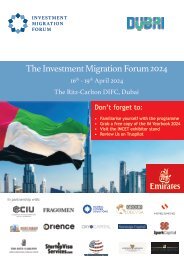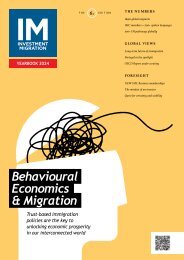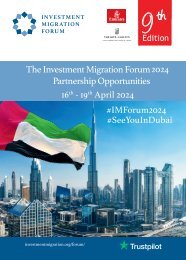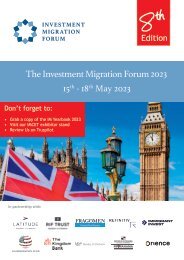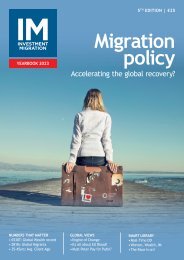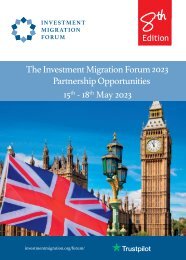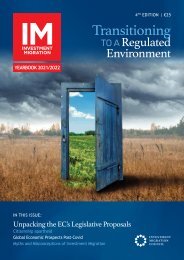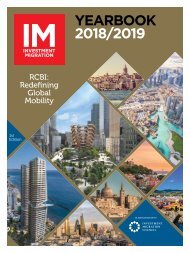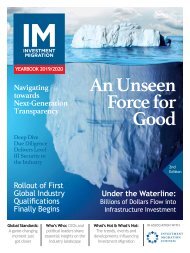IM Yearbook 2020/21
Born from the need for a global, credible, “go-to” publication, the 3rd IM Yearbook offers valuable access to a prime target audience of top industry influencers, decision makers, and the foremost referral network to the world’s most influential Investment Migration programmes: Government officials such as Heads of CIU’s, policy makers, academics, migration agents, law firms, wealth managers, financial advisors, real estate developers, and international firms involved in investment migration.
Born from the need for a global, credible, “go-to” publication, the 3rd IM Yearbook offers valuable access to a prime target audience of top industry influencers, decision makers, and the foremost referral network to the world’s most influential Investment Migration programmes: Government officials such as Heads of CIU’s, policy makers, academics, migration agents, law firms, wealth managers, financial advisors, real estate developers, and international firms involved in investment migration.
Create successful ePaper yourself
Turn your PDF publications into a flip-book with our unique Google optimized e-Paper software.
The reports argue that both RBI and CBI programmes<br />
should implement the same due diligence standards<br />
based on a five-step process. However, there is<br />
no supranational body regulating the investment<br />
migration industry, and it falls on governments to<br />
ensure that minimum standards are met. What are<br />
your thoughts and opinions on this matter? Will we<br />
see greater harmonisation in the years ahead?<br />
JS: While there may not be a supranational body regulating the industry, there have<br />
been some significant developments regulating how “golden visa” applicants should<br />
be treated. The 5th EU Anti-Money Laundering Directive stipulates “Golden Visa”<br />
applicants should be classified as “high risk” which in turn, requires enhanced due<br />
diligence. This is an important step in institutionalising the level of due diligence<br />
that needs to be applied. But ultimately, what would really move the needle is<br />
industry self-regulation. We should use the recent scrutiny on the industry to selfpromote<br />
the importance of uniform application of due diligence across agents and<br />
governments. We will only address the criticism through standardization, otherwise<br />
lax controls in certain programmes will adversely affect the whole industry.<br />
SW: The agents and banks processing the application payments and opening<br />
applicants’ accounts in many jurisdictions already need to follow Anti-Bribery and<br />
Corruption (ABC) and Anti-Money Laundering (AML) regulations and apply the<br />
verification procedures under their Know-Your-Customer (KYC) policies. These,<br />
however, vary from one jurisdiction to another and so cannot be fully relied upon<br />
by the investment migration sector. Because of the legal implications of citizenship<br />
or residency status as independent state matters, the industry needs to rely on<br />
standards driven by associations such as <strong>IM</strong>C. The lack of supra-national oversight<br />
is somehow replaced in the sector by the scrutiny and attention that the press, NGOs<br />
and civil society give. This, in turn, drives an increased reputational and political<br />
risk for those governments who do not adhere to risk management best practices.<br />
EL: The programmes with which we work all demand a high level of documentation<br />
and substantial paperwork to support the application process. We apply the same<br />
degree of due diligence to all CIUs and pride ourselves in our professionalism and high<br />
standards. There is scope to introduce a minimum standard across the board, but the<br />
responsibility also lies with the due diligence provider to highlight any areas lacking that<br />
will result in ineffective due diligence, on a case by case basis. Technology could offer<br />
some effective solutions to harmonise some areas, including standardising forms and<br />
templates and allowing for digital IDs and security features to be built in at an early stage.<br />
The lack<br />
of supranational<br />
oversight is<br />
somehow<br />
replaced in the<br />
sector by the<br />
scrutiny and<br />
attention that the<br />
press, NGOs and<br />
civil society give.<br />
Silvia Wolos<br />
LA: Regulation of minimum due diligence standards, both at the agent and<br />
government levels, remains a challenge and topic for further discussion. At the<br />
agent level, similar to the banking industry, there is the possibility of implementing<br />
measures such as fines and/or bans, but without an industry-specific regulatory agency,<br />
infractions are difficult to investigate, and enforcement is seemingly impossible.<br />
The question of enforcement and regulation becomes significantly more difficult<br />
at the government level, as the autonomy and decision-making ability of the nation<br />
states is an undeniable factor. Industry regulation and compliance is ultimately<br />
possible, but it is going to take further exploration and solution-seeking.<br />
Ultimately though, the agents and government programmes that choose to<br />
subscribe to the minimum standards outlined in the reports will also hopefully follow<br />
guidance from the reports around increased levels of transparency, which serves to<br />
better the security and reputation of the industry. Regardless of the regulation in<br />
place, all stakeholders in this industry have a vetted interest in its continuation and<br />
success, and it is our desire that these reports serve as a catalyst for industry progress.<br />
78<br />
Investment Migration <strong>Yearbook</strong> 2O2O/2O<strong>21</strong>




